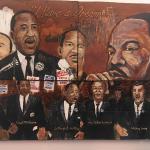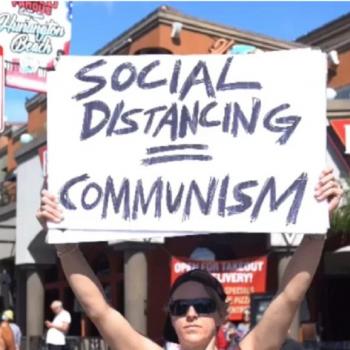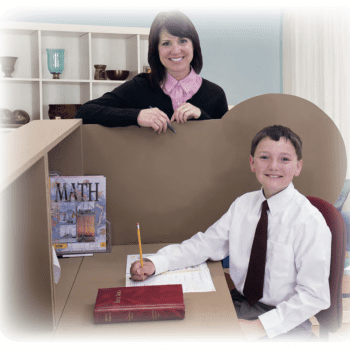Several recent conversations have turned my mind to the January of my first year of college. It was then that I learned about Martin Luther King Jr. Day. I have vague memories of learning about Harvey Milk around the same time, and of getting that all confused with “MLKJ” Day. Yes, I know—most kids learn about Martin Luther King Jr. Day in kindergarten. But I didn’t. I was homeschooled.
You can be homeschooled and learn about Martin Luther King Jr. Day. Some African American parents homeschool so that their children can receive an education grounded in black history and culture, rather than one centered on whiteness and a European cultural heritage. Many white homeschoolers observe Martin Luther King Jr. Day, taking the opportunity to learn more about the civil rights movement and black history. But I was raised in a conservative white evangelical Christian homeschool family and community.
Some years back, someone posted in a facebook homeschool alumni group I was in asking for information about Martin Luther King Jr. She explained that she hadn’t known about Martin Luther King Jr. Day until adulthood, and that she was still missing much of the history of the civil rights movement. Did anyone have any helpful online resources they could share? Commenter after commenter affirmed her experiences and said me too. It became a moment of collective learning and cultural catching up.
I’ve spoken with homeschoolers who learned nothing at all about the civil rights movement. I was little better off. I learned about the Civil War and about Harriet Tubman and Abraham Lincoln—and I remember learning something about Booker T. Washington, who founded Tuskeegee, and George Washington Carver, of peanut fame—but the history program we used petered off after WWII. I learned about the civil rights movement of the 1950s and 1960s only because I enjoyed history and was an avid reader.
I was still the kid having my mind blown by the standard college history survey course while everyone else sitting around me was bored, having already heard most of this in their high school history survey course.
In retrospect, though, I’m glad my homeschool history program was so deficient in covering recent history. This may have left me largely ignorant, but it also left me better off than my peers, who learned from textbooks like Abeka or ACE, which covered the civil rights movement only to portray it as a troublesome movement that may have had good intentions (if they’re generous) but turned out badly.
It’s worth taking a moment to look at the history of Christian homeschool textbooks (and the Christian homeschooling movement). The Christian homeschooling movement was born in the 1980s out of a specific religious and political milieu. As fundamentalist parents turned to homeschooling, conservatives in Congress opposed making Martin Luther King Jr. Day a holiday. Conservatives filibustered. They claimed Martin Luther King Jr. was a Communist. Even Reagan initially opposed creating the holiday.
Many textbook companies used by homeschoolers—including Abeka and ACE—were founded in the early 1970s to serve the fast-growing Christian school movement. It’s no coincidence that the Christian school movement began at the very moment the public schools desegregated. Jerry Falwell founded Liberty Christian Academy the same year the local public schools desegregated—and initially limited enrollment to white students. You can’t untangle the history of Christian schools from the history of desegregation.
By the 1970s and 1980s many Christian schools admitted black and brown students, and many Christian school administrators sought to distance themselves from their comrades who preached racial separation. Race was not the only motivation driving the Christian school movement. However, even schools that didn’t discriminate in enrollment tended to be far, far whiter than their surroundings, and many parents described their choice to send their children to Christian schools in ways that were racially coded.
And there was another problem—textbook publishers who wanted the biggest market share would have to publish books that were acceptable to racists and non-racists alike (but rarely anti-racists, as even those Christian schools that disavowed white separatism tended to be non-racist but not anti-racist). As a result, Christian homeschool movement was not only founded in a moment of conservative opposition to honoring Martin Luther King Jr. but also fed by textbooks designed to be acceptable to racist Christians.
Many evangelical parents who came to homeschooling in the later 1980s and 1990s were likely unaware of much or some of this history, but they got thrown into a world where this history shaped textbooks, co-ops, and courses of study nonetheless. There likely were (and are) plenty of conservative evangelical homeschooling parents that came to this with open eyes. After all, there’s a strong strain within conservatism today that still looks askance at the “excesses” of the civil rights movement.
My advice to anyone homeschooling today is to not assume that homeschool curricula includes the history public school children learn each January when Martin Luther King Jr. Day roles around, or the things public school students learn in February during Black History Month. Some homeschool curricula (the good kind) may include all of this and more, but this is not a given, and many programs won’t. Some ingenuity—and trips to the library—may be in order. Don’t assume things are in the curriculum that might not be. Be vigilant. Check. Ask questions.
We often look at public schools as a way to ensure every student learns certain things—and not just basic academic things. Sex education was born this way, out of a desire to ensure that every child has access to basic information about sex and reproduction. (It only later was subverted by conservatives.) Martin Luther King Jr. Day functions this way as well—while the system isn’t perfect and there’s likely a good deal of geographic variability, most schools set aside time to teach students about this holiday each year. Homeschoolers, however, exist outside of this system.
And that’s how you can end up with kids who reach college without having heard of Martin Luther King Jr. movement—or the civil rights movement.
I have a Patreon! Please support my writing!















